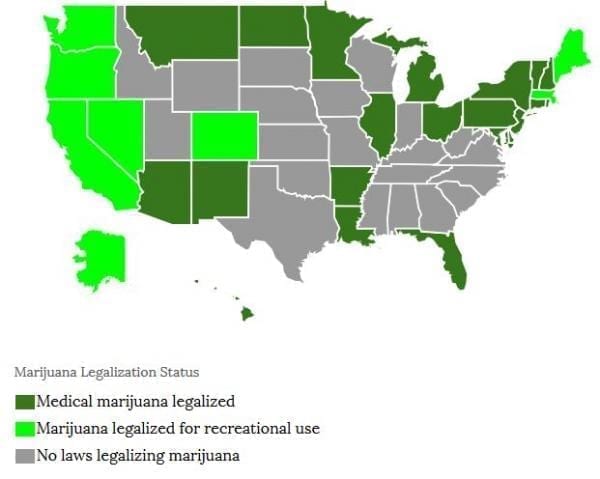The Rohrabacher-Farr amendment is perhaps the most significant existing federal protection order for medical marijuana patients and others abiding by state medical cannabis laws. With the nomination of Senator Jeff Sessions to be the next Attorney General, the Rohrabacher-Farr amendment is now more important than ever before.
The Rohrabacher-Farr amendment was aimed at protecting the medical marijuana industry and its consumers. In short, the provision prohibits the Department of Justice from using government funds to prosecute individuals or businesses who are acting in compliance with their state’s medical marijuana laws.

Support for the Rohrabacher-Farr amendment
According to rohrabacher.house.gov, Rep. Dana Rohrabacher and Rep. Sam Farr wrote a letter to the House Appropriations Committee in autumn. The letter urged them to keep the amendment in effect after December ’16. They write to assure the continued base of support of the amendment;
“The provision has twice before enjoyed broad bipartisan support in the House—first by a vote of 219-189 in May 2014, and most recently by a vote of 242-186 in June 2015. The Senate Committee on Appropriations also has a history of supporting this legislation, most recently through a bipartisan vote of 21-8 earlier this year.”
On the day after Donald Trump’s election, four more states including California voted to make the recreational use of marijuana legal. This brings the total amount of states to eight, with the medicinal use of marijuana legalized in 28.

Americans for Safe Access have described a significant drop in the number of raids against growers and dispensaries. This is thanks to both the Rohrabacher-Farr amendment and the 2013 Cole Memo urging U.S. Attorneys to deprioritize prosecution of those obeying cannabis laws within their state. If Sessions is made Attorney General, “Sessions could repeal the Cole Memo guidance at any point. The Rohrabacher-Farr amendment is binding law, although it must be reauthorized every year.”
The Department of Justice chose to stay out of marijuana enforcement affairs in certain states. This was under the condition that certain criteria were met under state laws. The states that had legalized cannabis for medical or recreational use were for the most part left alone under the Obama administration.
The Cole Memo

Former U.S. Deputy Attorney General James Cole drafted the memo. It came to be known as the Cole Memo. The Department of Justice website lists the federal enforcement priorities on the policy. These intend to focus limited resources where they are most crucial;
- Preventing the distribution of marijuana to minors;
- Preventing revenue from the sale of marijuana from going to criminal enterprises, gangs, and cartels;
- Preventing the diversion of marijuana from states where it is legal under state law in some form to other states;
- Preventing state-authorized marijuana activity from being used as a cover or pretext for the trafficking of other illegal drugs or other illegal activity;
- Preventing violence and the use of firearms in the cultivation and distribution of marijuana;
- Preventing drugged driving and the exacerbation of other adverse public health consequences associated with marijuana use;
- Preventing the growing of marijuana on public lands and the attendant public safety and environmental dangers posed by marijuana production on public lands; and
- Preventing marijuana possession or use on federal property.
So, what’s next?
The Rohrabacher-Farr amendment was included in a short-term spending bill passed by Congress and signed into law again during September. This allowed it to remain in effect until December when it was renewed once again in the same way. The current extension expires on April 28th. This keeps the protection order in place for another few months before Congress must reconsider it, yet again.
The Washington post points out Sessions’ criticism of Obama’s approach towards the whole issue. “I think one of [Obama’s] great failures, it’s obvious to me, is his lax treatment in comments on marijuana…” he said.
The medical marijuana community is nervously awaiting the outcome. Supporters will need to work together to make sure that the provision makes its way into the next appropriations bill. Congress is expected to debate and vote next in late April. If the provision doesn’t make the cut, the DEA will once again have the freedom to hammer down on states that have legalized Marijuana for medicinal use.

The amendment is currently on extension, expires on April 28, 2017, and is expected to continue. Even though it has been stated that the Trump administration is against recreational marijuana, they do support medicinal marijuana which the amendment applies to.










I am truly thankful to the owner of this web site who has shared this fantastic piece of writing at at this place.
Nice post. I learn something totally new and challenging on websites
I’m often to blogging and i really appreciate your content. The article has actually peaks my interest. I’m going to bookmark your web site and maintain checking for brand spanking new information.
I truly appreciate your technique of writing a blog. I added it to my bookmark site list and will
For the reason that the admin of this site is working, no uncertainty very quickly it will be renowned, due to its quality contents.
I do not even understand how I ended up here, but I assumed this publish used to be great
I really like reading through a post that can make men and women think. Also, thank you for allowing me to comment!
I very delighted to find this internet site on bing, just what I was searching for as well saved to fav
naturally like your web site however you need to take a look at the spelling on several of your posts. A number of them are rife with spelling problems and I find it very bothersome to tell the truth on the other hand I will surely come again again.
I very delighted to find this internet site on bing, just what I was searching for as well saved to fav
I truly appreciate your technique of writing a blog. I added it to my bookmark site list and will
มีพันธุ์หายากและไม้พิเศษให้เลือก
UFABET ปลอดภัยและโปร่งใส 100%
UFABET ปลอดภัยและโปร่งใส 100%
UFABET ปลอดภัยและโปร่งใส 100%
การฝากถอนเงินรวดเร็วทันใจ ไม่ต้องรอนาน ทำให้การเล่นเป็นไปอย่างต่อเนื่อง
การฝากถอนเงินรวดเร็วทันใจ ไม่ต้องรอนาน ทำให้การเล่นเป็นไปอย่างต่อเนื่อง
การบริการของ สวนอรุณี รวดเร็ว ทันใจ และเป็นกันเอง ทำให้รู้สึกสบายใจตลอดกระบวนการทำงาน
ระบบรักษาความปลอดภัยยอดเยี่ยม ทำให้มั่นใจได้ทุกครั้งที่เข้าใช้งาน
การฝากถอนเงินรวดเร็วทันใจ ไม่ต้องรอนาน ทำให้การเล่นเป็นไปอย่างต่อเนื่อง
โปรโมชั่นและโบนัสจัดเต็ม คุ้มค่าทุกการลงทุน เล่นแล้วได้กำไรดีจริง ๆ
สามารถเล่นได้ทุกที่ทุกเวลา ทั้งบนมือถือและคอมพิวเตอร์ สะดวกสุด ๆ
พร้อมขนย้ายเศษวัสดุ เคลียร์พื้นที่สะอาด
หากคุณกำลังมองหาผู้เชี่ยวชาญด้านการจัดสวนที่ไว้ใจได้ สวนอรุณี คือตัวเลือกที่ยอดเยี่ยมอย่างแท้จริง
โปรโมชั่นและโบนัสจัดเต็ม คุ้มค่าทุกการลงทุน เล่นแล้วได้กำไรดีจริง ๆ
ทีมงานบริการลูกค้าเป็นเลิศ ตอบคำถามรวดเร็วและให้ความช่วยเหลืออย่างมืออาชีพ
ผู้เล่นสามารถทดลองเล่นเกมต่างๆ ได้ฟรีก่อนที่จะตัดสินใจเดิมพันด้วยเงินจริง ซึ่งเป็นโอกาสที่ดีในการทำความคุ้นเคยกับเกมและเว็บไซต์
เว็บไซต์พนันบางแห่งยังมีการนำเสนอเกมใหม่ๆ อย่างสม่ำเสมอ เพื่อให้ผู้เล่นได้สัมผัสกับประสบการณ์ที่สดใหม่และไม่น่าเบื่อ
การเล่นเกมบนเว็บไซต์พนันสามารถเป็นกิจกรรมที่ผ่อนคลายและสนุกสนาน หากผู้เล่นรู้จักควบคุมตนเองและเล่นอย่างมีสติ
เว็บไซต์พนันบางแห่งยังมีการนำเสนอสถิติและผลการแข่งขันกีฬาแบบเรียลไทม์ เพื่อให้ผู้เล่นสามารถติดตามสถานการณ์และทำการเดิมพันได้อย่างแม่นยำ
เว็บไซต์พนันบางแห่งยังมีฟังก์ชันการเล่นสด (Live Casino) ซึ่งผู้เล่นสามารถเดิมพันกับดีลเลอร์จริงผ่านการถ่ายทอดสด ทำให้ได้รับประสบการณ์ที่สมจริงเหมือนกับการเล่นในคาสิโนจริง